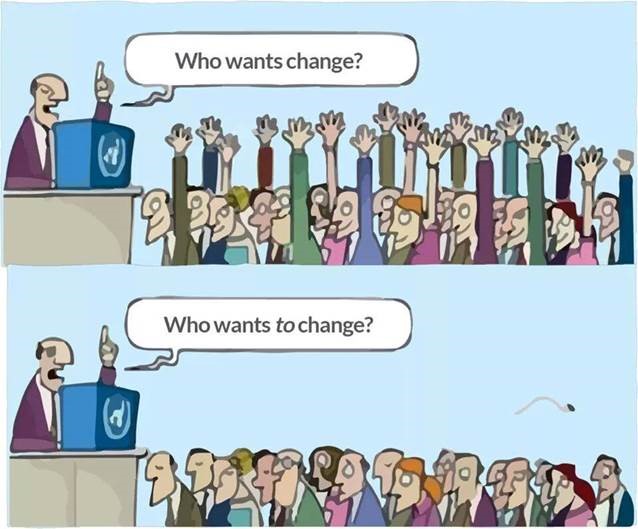“I am becoming convinced that confronting people with ‘facts’, although necessary to better understand our predicament, will be almost completely ineffectual when it comes to altering our course… facts are secondary to accessing raw emotions when it comes to change…”
Nate Hagens
The large majority of all of the work we do with the ABC-M tetrad model is about providing clients with a better understanding of the intangible needs of their customers. A few of the braver ones are now also beginning to ask whether the model is also applicable to their employees. The nice thing about universal models, like ABC-M, is that the answer is an easy ‘yes, this also applies to the people within your organisation.’
That said, I suspect the reason few organisations are as yet asking the question is their instincts are telling them they won’t like the answer.
The simple rule, when we’re thinking about customers, is that innovation occurs when Autonomy, Belonging, Competence and Meaning all get better.
The corollary when switching the model to look inside organisations is perhaps something like, ‘success happens when employee Autonomy, Belonging, Competence and Meaning all get better’. ‘Success’ in the context of the workplace can be any number of things. Successful change. Successfully engaging people in their work. Successful project outcomes. Etc.
And therein lies the problem – or ‘problems’ – for most jobs and most organisations. Managers and leaders know that Autonomy, Belonging, Competence and Meaning for the most part don’t get better when people step across the company threshold and turn themselves into employees:
Autonomy – I often hear people saying, ‘I love change, I hate being changed’. What they hate, I think, is the loss of autonomy that occurs when managers ‘inflict’ change on their charges. For most of us, the moment we step into the office, we know that our level of Autonomy just took a turn for the worse: we used to be in control, now our boss is.
Belonging – if management have done their job in any way well, this is the easiest of the tetrad to get right. When people feel loyal to the organisations they work for, their sense of Belonging increases. They feel a sense of pride to be part of the team. The polo shirt with the company logo on it, or the team lanyard are both symbols of increased Belonging… or rather, they are provided people are actually proud to be ‘wearing the shirt’. One often gets the sense in some organisations that wearing the company logo detracts from a person’s true sense of Belonging – the logo being a sign that, by forcing them to wear it, you’ve just removed them from the (cool) tribe they were a member of before they stepped into the office and forced them to join your very uncool work tribe.
Competence – it is sometimes said that there are only three universal taboos – never criticise a person’s religion, life-partner or work. The last of these three is all about the Competence we feel when we know we’re good at our job, and how we really don’t like it when that competence comes in to question in any way. When people say, ‘I love change, I hate being changed’, what they’re typically also implying is, ‘provided it doesn’t make me feel like an incompetent idiot’. Change is uncomfortable for everyone because almost inevitably it causes our perceived level of Competence to dip, albeit hopefully temporarily. One of Apple’s biggest insights over the years has been to create products where, from the moment the customer opens the box, they feel more Competent than they were when the lid was still taped down. When we have to open a user-guide, our sense of Competence goes down. What Apple learned with their intuitive user interface design is what most organisations still need to learn when people enter the workplace: we all need to feel like we’re good at stuff. And we need to be able to demonstrate that competence to the people around us.
Meaning – the really tough one. To the extent that several clients have in effect asked us to remove it from the tetrad when we’re trying to help them measure what’s going on in their workplace. ‘Making ABC better’ is something they can live with. Making things more ‘meaningful’ is much more difficult. And the honest truth in far too many organisations right now is that a very large proportion of the work we ask people to do is worse than meaningless. Over time, one hopes, all the meaningless work will be eliminated (or given to the robots to do), but right now, for the most part, measuring Meaning – or the lack thereof – is a surefire way of depressing a majority of the people in your organisation. Nothing ever improves, of course, until we are able to measure it. Which is why the more enlightened organisations are now beginning allow for the ‘meaningful-ness’ of work to become something they should be measuring and sharing around the organisation. We’re still a long way away from the ‘war on meaningless work’ that is probably needed in most parts of society, but at least putting it on the radar – and letting managers know it is measurable – is a small step in the right direction.
And if that sounds like uncharacteristic optimism on my part, it probably is.
(PanSensic already has an ABC-M narrative analysis lens. If you’re feeling brave and want to explore how close your organisation or your employees are to achieving the ‘ABC-M all get better’ business success criterion, give me a shout.)


